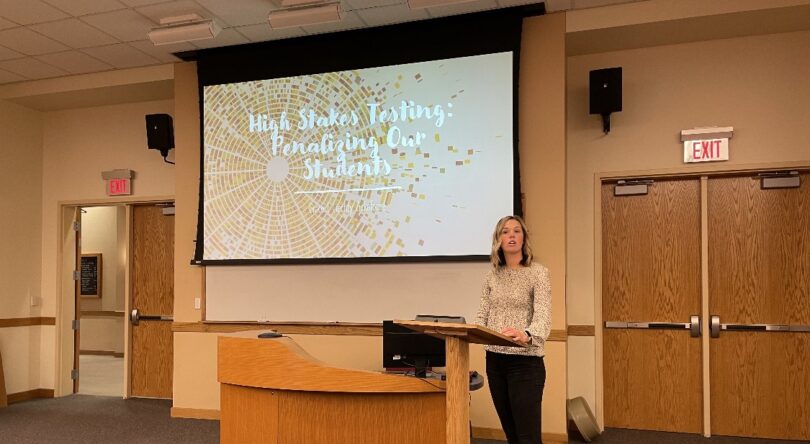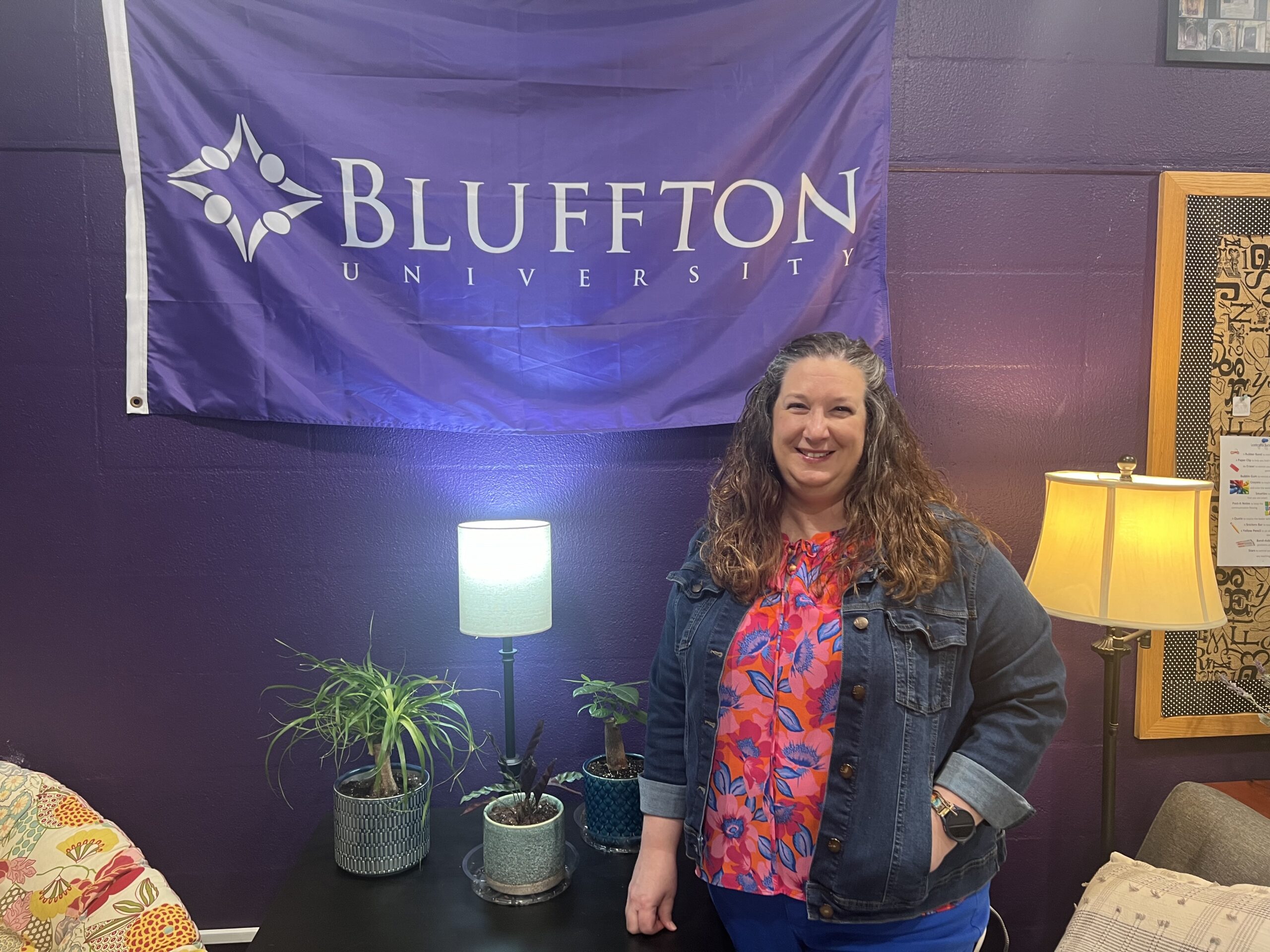Imagine you made a presentation for a class, and it doesn’t stay at the top of your mind after turning it in. Then, a year and a half later, you are asked to give a public presentation of said assignment. This is what juniors Grace Zickafoose and Cierra Long and senior Grace Zachrich were tasked with for Civic Engagement Day April 6.
The three were students in Paul Neufeld Weaver’s Social and Philosophical Issues in Education course in fall 2020. The course requires students to focus on an issue that stood out to them and to make a presentation about how to improve it.
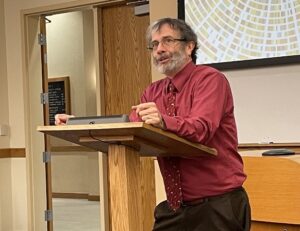
Paul Neufeld-Weaver introducing Zickafoose, Long and Zachrich at the beginning. Photo by Olivia Westcott.
Students currently enrolled in the course are still working to complete their presentations. Neufeld Weaver remembered the presentations by Zickafoose, Long and Zachrich in 2020 and asked them to present at this year’s Civic Engagement Day.
These presentations begged the question of whether there are simple solutions to larger problems present in the education system. What is common between each of these issues is the fact they all consider students who often don’t get a voice.
Grace Zickafoose on state testing in schools
Zickafoose presented on state testing and how it is a penalizing act for everyone involved, from students to teachers to the school as a whole. She grew up doing state testing and remembers it being rather stressful, and even said it was her least favorite part of the school year. Zickafoose noted there isn’t a benefit of the testing since each child is different.
“State testing is all generalized,” said Zickafoose.
She said all students take the same test, and it doesn’t matter whether they have a disability or need accommodations. It is important to stand up for these students specifically so every child has the same chance, Zickafoose said.
“If these tests aren’t correctly measuring students’ knowledge, then why are we forcing them to go through so much anxiety and stress on a yearly basis?” asked Zickafoose.
Cierra Long on support for neurodivergent learners
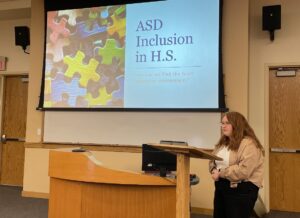
Cierra Long presenting on inclusion of students on the Autism Spectrum. Photo by Olivia Westcott.
Long presented on the need for more inclusion in high schools for students with an Autism Spectrum Disorder. She wishes for aspiring educators to receive more education on what to do when a student who is on the spectrum starts to feel overstimulated and becomes reactive.
Students who are on the spectrum can have mixed schedules, where they are in a resource room with other special needs peers, and in general education courses with their neurotypical peers, Long said. As a result, there are educators who aren’t necessarily trained to help neurodivergent students, even though they are a part of some of their classes.
“I think my thing is, oftentimes if you’re a teacher, you are neurotypical,” said Long. “Really just trying to learn what the experiences are like for neurodiverse people, I think is the first step to realizing that we as neurotypical people accommodate to neurotypical needs when those aren’t the needs that need to be accommodated for.”
Long has a younger brother who is on the Autism Spectrum, and she recently became the advocate for his Independent Education Plan. IEPs are for students who have different needs when in the classroom, and they allow the students to have the same opportunities as their peers without IEPs.
“I don’t agree with using the words high-functioning or low-functioning, but his school considers him a high-functioning student,” said Long. “They just expect the same of him as his neurotypical peers, but they don’t give him the same opportunities. He’s starting to hate school, and he loves learning.”
Grace Zachrich on the benefits of service dogs in school
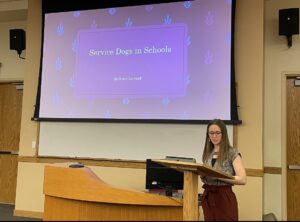
Grace Zachrich beginning her presentation about service dogs in school. Photo by Olivia Westcott.
Zachrich presented on service dogs being schools, and how there shouldn’t be any argument on their validity or degree of belonging. Service dogs serve purposes to either help a student academically or medically, and can even save a student’s life.
Medically, service dogs are able to alert the student as well as others students or the teacher of an impending seizure per say or smell a dangerous change occurring in the students body. These are abilities we as humans don’t have, so it is very helpful to have a service and living thing which can make us aware sometimes an hour before something happens to the student.
Zachrich described how students might have trouble making friends or feeling comfortable at school. A service dog can help make them comfortable and be their friend in an environment where they might feel they don’t have many, she said.
Being in student teaching and having been placed in different classes and buildings, Zachrich has seen many different students who each have different and unique abilities. Something Zachrich doesn’t see in the schools are service dogs, and she wonders why this is the case and why there aren’t more since they are very helpful and beneficial.
Students respond
Among the attendees were other aspiring educators, two of whom were sophomores Tyson Speyer and Caitlin Bennet.
Speyer is an elementary education major. From the presentations, he said the younger educators are getting more involved in the core of the structural issues instead of teaching and staying in their own classroom.
“The most interesting thing of the presentation was learning about ways how we as students can help affect some of these problems, and how even though we are not teachers yet we still have a voice when it comes to solving these problems,” Speyer said.
Bennett is an intervention specialist major and is one of the current students in the Social and Philosophical Issues in Education course. She attended the presentation to get some inspiration for her own research presentation, which is due later this month.
In becoming an intervention specialist, Bennett said it would be her job to be aware of students’ individual needs and how to accommodate those in the best way. She said she found Zachrich’s presentation the most interesting since she hadn’t thought about the use of a service dog as being an accommodation for a student. Bennett noted how in order for students to be able to succeed, they need to be seen and feel seen by their instructors.
“One of the biggest things that stuck with me was the idea that we need to advocate for our students’ needs as though our lives depend on it — because their lives do,” said Bennet.

